Check out videos of all my movie reviews on KSNT-NBC, KTKA-ABC, and KTMJ-FOX, Kansas First News.
The video review above from Kansas First News is a shortened version of the print review below:
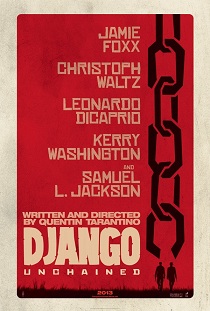 Quentin Tarantino is such an iconoclastic filmmaker that any discussion of his work invariably brings up comparisons to his earlier films.
Quentin Tarantino is such an iconoclastic filmmaker that any discussion of his work invariably brings up comparisons to his earlier films.
He works in familiar genres and plays with similar themes in all of his movies, but the synthesis of the writer/director’s increasingly cult-flavored obsessions and his uncanny ability to create unforgettable moments has always resulted in something that transcends the genre itself.
At least, that is, until Django Unchained.
Although it is set in the Antebellum South during the height of this country’s shameful slavery practices and gleefully revels in the brutality of that period to shocking effect, Django Unchained never quite achieves the poignancy of Tarantino’s previous rewriting-history revenge fantasy Inglourious Basterds.
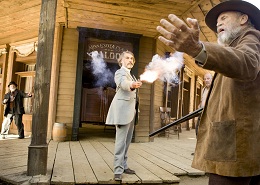 That’s not to say that Django Unchained isn’t full of terrific performances. It is, especially from Tarantino veterans Samuel L. Jackson and Christoph Waltz. As Stephen, a sharp-as-nails plantation house slave, Jackson is electrifying. The scowl is permanently fixed on his face, but having the ear of his master and the cunning to manipulate him, Stephen has more power than anyone in the house.
That’s not to say that Django Unchained isn’t full of terrific performances. It is, especially from Tarantino veterans Samuel L. Jackson and Christoph Waltz. As Stephen, a sharp-as-nails plantation house slave, Jackson is electrifying. The scowl is permanently fixed on his face, but having the ear of his master and the cunning to manipulate him, Stephen has more power than anyone in the house.
And three years after winning an Oscar for playing the scary/campy “Jew Hunter” in Basterds, Waltz again shows how singularly qualified he is to turn Tarantino’s wordy dialogue into gold with impeccable comic timing. Despite all of his bravado and skills, Waltz gives bounty hunter Dr. King Schultz a surprising amount of tenderness as well.
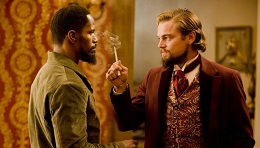 Even Leonardo DiCaprio is on hand, taking a rare opportunity to relish in the banality of evil rather than take a typical leading-man role. His plantation owner Calvin Candie is a product of familial Southern aristocracy, and a portrait of a pampered man trying desperately to achieve respect and admiration on his own sick terms.
Even Leonardo DiCaprio is on hand, taking a rare opportunity to relish in the banality of evil rather than take a typical leading-man role. His plantation owner Calvin Candie is a product of familial Southern aristocracy, and a portrait of a pampered man trying desperately to achieve respect and admiration on his own sick terms.
Django Unchained is also full of inspired scenes of sheer lunacy. It’s as episodic as Basterds and the Kill Bills, having drawn from the same spaghetti western well, and it deals frankly (and violently) with the horrors of slavery. Only Tarantino would approach such a sensitive subject with the ferociousness of a rabid dog.
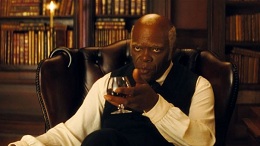 With key scenes built around the torture, fighting, and killing of slaves for amusement, Django Unchained is not for the faint of heart. That said, the blunt treatment of slavery throughout the film is also enough to spark serious discussion about its lasting effect on the country.
With key scenes built around the torture, fighting, and killing of slaves for amusement, Django Unchained is not for the faint of heart. That said, the blunt treatment of slavery throughout the film is also enough to spark serious discussion about its lasting effect on the country.
As an entertaining revenge flick with roots in exploitation films and spaghetti westerns, Django Unchained succeeds. But it never rises above its genre to become a real, affecting emotional experience. Part of that is pacing. The film feels choppy, and unwieldy transitions are abound as it shifts gears in fits and starts to spotlight the best scenes while keeping forward movement alive. Meanwhile, character development on the part of Django—and the wife he is searching for—is lacking.
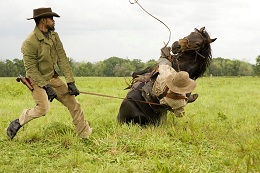 Another part of the problem is the lead actor. There’s a reason I haven’t mentioned him until now. As Django, Jamie Foxx is uncharacteristically bland. Sure, he’s supposed to be stoic—following in the tradition of Clint Eastwood’s Man With No Name and other strong, silent types—but he’s a bit of a cipher. There doesn’t seem to be much going on behind his eyes. Perhaps the idea was to make Django stick out by being surrounded by big personalities and performances, but Foxx doesn’t add any weight to the role.
Another part of the problem is the lead actor. There’s a reason I haven’t mentioned him until now. As Django, Jamie Foxx is uncharacteristically bland. Sure, he’s supposed to be stoic—following in the tradition of Clint Eastwood’s Man With No Name and other strong, silent types—but he’s a bit of a cipher. There doesn’t seem to be much going on behind his eyes. Perhaps the idea was to make Django stick out by being surrounded by big personalities and performances, but Foxx doesn’t add any weight to the role.
As the long list of former TV/movie stars and b-movie regulars cycle through supporting roles and cameos, Django Unchained does achieve some of those quintessential Tarantino moments of cinematic bliss, which only makes the moments that don’t reach that more frustrating. The movie is lumpy and doesn’t always unfold with the urgency that it should.
The drawn-out finale is a perfect example. It feels like an experiment in genre expectations, alternately rewarding and subverting them to frustrating effect. It all builds up to a good and bloody showdown, but it is part of why Django Unchained lacks the fully fleshed out emotional experience that Tarantino has been able to pull off with such unlikely frequency before.








{ 5 comments }
Always good to get the straight truth from Mean Melin – it should be a fun day at the cinema! (Makes a fella wonder if there’s a top 10 floating around that arbitrarily ranks Tarantino characters… = )
i have to disagree on your uneven remark about the film. i found it to be very deliberate. but i do think jackson and waltz were the major standouts in the movie. i don’t think foxx was as much stoic as he was contemplative with every decision he made for his character. it was intriguing to watch
My thoughts exactly. Doesn’t stack up to his other works but finds its place in them. The performances were spot on and was entertained through out, but the ending could have been shorter and smarter. With that being said, Tarantino is still the master of tension.
If you had never seen a Tanantino film before….this would blow your mind. The fact that Quenton has made enough films for us to bring our own cookie cutter into the theater and try to stuff his work into it is a testament to his carving his own groove into viewers minds. Candy demanding a handshake was awesome. Steven was laughable in 2012 but would have been the primary antagonist in the 70’s or 80’s….which shows either social progress or highlights the majorities naivety depending on how uptight you are. Lastly….Christoph Waltz is flipping amaze-balls and I wouldn’t mind sitting in a chair and listening to him talk while he rips teeth out of my head.
Yeah, I’m pretty excited to see the eventual director’s cut and see what else QT had in store. I’ve heard about a lot of cut scenes from the original screenplay…
Comments on this entry are closed.